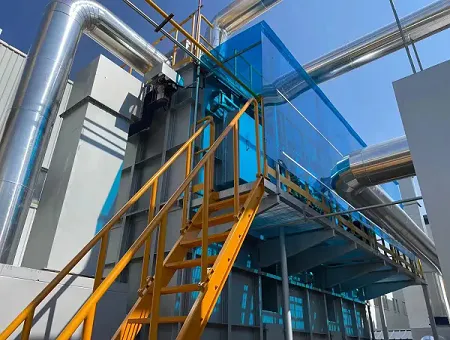
Industrial hot air combustion system
 current location:Product Introduction
current location:Product Introduction


Hot air combustion system
 Product Introduction
Product Introduction
product
Product1、 Introduction to Industrial Hot Air Combustion System:
The industrial hot air combustion system is a thermal energy device that fully mixes fuel and air in a burner to produce high-temperature flue gas, and then uses the principle of heat exchange to transfer the heat of the flue gas to the airflow passing through the hot air chamber, thereby generating the required process temperature hot air. This system has the characteristics of high thermal efficiency, adjustable temperature, energy conservation and environmental protection, good safety performance, and flexible use. It is widely used in many industrial processes such as metal heat treatment, industrial coating and drying, food processing, plastic molding, textile printing and dyeing, providing stable and reliable high-temperature heat sources for these production links. It is an indispensable core thermal equipment for modern industrial production lines.
2、 Characteristics of industrial hot air combustion system:
1. High thermal efficiency
By optimizing the burner design, achieving sufficient mixing and complete combustion of fuel and air, as well as efficient heat exchange in the hot air chamber, the thermal efficiency of the system is usually at a high level of 70% -90%.
2. Temperature adjustable
By controlling the supply of fuel and combustionair, as well as adjusting the secondary air volume, the hot air temperature can be precisely controlled to meet the requirements of different processes for hot air temperature. The temperature range is usually 150 ℃ -1200 ℃.
3. Energy conservation and environmental protection
The combustion system adopts the principle of fully premixed combustion, which allows the fuel to be fully mixed with air before combustion, thereby reducing incomplete combustion and the generation of pollutants. At the same time, the high efficiency of heat exchange also reduces heat loss and energy consumption.
4. Excellent safety performance
Equipped with multiple safety protection devices such as explosion-proof doors, flame detectors, emergency stop switches, and made of corrosion-resistant and heat-resistant materials to ensure long-term safe operation. Some systems also have safety functions such as backfire prevention and flameout prevention.
5. Flexible and convenient to use
Multiple fuels such as natural gas, liquefied petroleum gas, and fuel can be selected to meet the needs of different users. The degree of control automation is high, and the amount of manual operation and maintenance is small. Compact structure, small footprint, the entire system is integrated into one equipment unit, compact layout, small footprint, easy to install and arrange.
6. Long life cycle
High quality heat-resistant materials are used, which is convenient for operation and maintenance, and has a long service life. It is a long-term fixed assets investment of the factory.
3、 Application of industrial hot air combustion system:
1. Metal heat treatment
Metal heat treatment processes such as quenching, tempering, normalizing, etc. require high-temperature heating. The hot air combustion system can provide high-temperature hot air at 600-1200 ℃ to meet the strict requirements of temperature and uniformity in heat treatment.
2. Industrial coating drying
In industrial coating production lines such as automobiles, home appliances, and plastics, it is necessary to quickly cure newly sprayed coatings. The hot air combustion system can provide 150-250 ℃ hot air for efficient drying, shortening the production cycle.
3. Food processing
The baking, drying, and sterilization processes in food manufacturing require hot air, such as baking bread, cookies, sausages, and drying agricultural products. The temperature of the hot air is generally between 80-300 ℃.
4. Plastic processing
Plastic processing processes such as injection molding, blow molding, and extrusion require melting or heating the plastic. The hot air combustion system provides hot air at 180-350 ℃ to the mold or heating section.
5. Textile printing and dyeing
The subsequent processes of fixing, desizing, and drying textiles use hot air at 130-180 ℃ for heat treatment to improve color fastness and reduce pollution emissions.
6. Chemical and Pharmaceutical Industry
Many chemical and pharmaceutical production lines require thermal processes such as drying and dissolution, and hot air combustion systems can provide the required heat.
7. Environmental Engineering
Environmental energy devices such as waste incineration power plants and biomass energy utilization require hot air combustion systems as heat source equipment.
8. Construction Engineering
Hot air combustion systems are also used for drying the interior and exterior walls of buildings, curing concrete, and providing geothermal heating.
MESSAGE
 Electronic mailbox:
Electronic mailbox:
807600036@qq.com
Looking forward to your contact! scan
scan